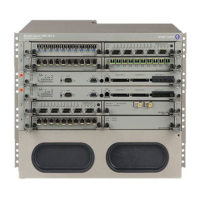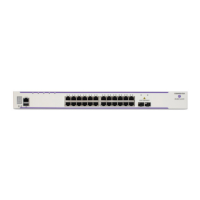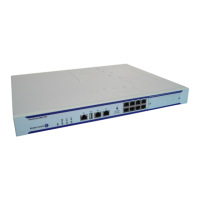Subscriber Services
7750 SR OS Services Guide Page 85
agg-rate-limit
Syntax agg-rate-limit agg-rate
no agg-rate-limit
Context config>service>customer>multi-service-site>egress
Description This command defines a maximum total rate for all egress queues on a service SAP or multi-service
site. The agg-rate-limit command is mutually exclusive with the egress scheduler policy. When an
egress scheduler policy is defined, the agg-rate-limit command will fail. If the agg-rate-limit
command is specified, at attempt to bind a scheduler-policy to the SAP or multi-service site will fail.
A multi-service site must have a port scope defined that ensures all queues associated with the site are
on the same port or channel. If the scope is not set to a port, the agg-rate-limit command will fail.
Once an agg-rate-limit has been assigned to a multi-service site, the scope cannot be changed to card
level.
A port scheduler policy must be applied on the egress port or channel the SAP or multi-service site
are bound to in order for the defined agg-rate-limit to take effect. The egress port scheduler enforces
the aggregate queue rate as it distributes its bandwidth at the various port priority levels. The port
scheduler stops offering bandwidth to member queues once it has detected that the aggregate rate
limit has been reached.
If a port scheduler is not defined on the egress port, the queues are allowed to operate based on their
own bandwidth parameters.
The no form of the command removes the aggregate rate limit from the SAP or multi-service site.
Parameters agg-rate — Defines the rate, in kilobits-per-second, that the maximum aggregate rate that the queues
on the SAP or MSS can operate.
Values 1 — 40000000, max
scheduler-override
Syntax [no] scheduler-override
Context config>service>customer>multi-service-site>ingress
config>service>customer>multi-service-site>egress
Description This command specifies the set of attributes whose values have been overridden via management on
this virtual scheduler. Clearing a given flag will return the corresponding overridden attribute to the
value defined on the SAP's ingress scheduler policy.
Parameters pir-rate — The pir parameter accepts a step multiplier value that specifies the multiplier used to
determine the PIR rate at which the queue will operate. A value of 0 to 100000000 or the
keyword max is accepted. Any other value will result in an error without modifying the current
PIR rate.
To calculate the actual PIR rate, the rate described by the queue’s rate is multiplied by the pir-
rate.
The SAP ingress context for PIR is independent of the defined forwarding class (fc) for the
queue. The default pir and definable range is identical for each class. The PIR in effect for a
